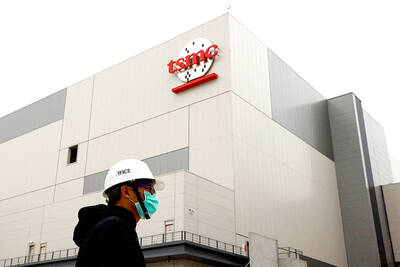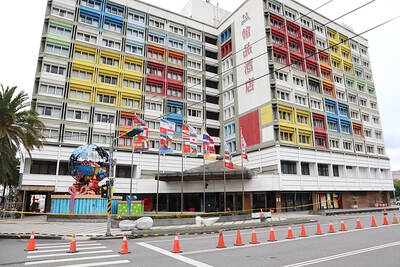Lunar New Year is the most important festival in the Chinese calendar, but instead of traditional reunion dinners, some families have another ritual: luxury apartment shopping in Singapore.
With the political unrest in Hong Kong showing no signs of stopping, Chinese buyers are zeroing in on Asia’s other major financial center, doubling sales of units at the top end of the market. Rich foreigners are largely undeterred by the higher taxes that are now levied on them.
Inquiries in the lead up to Lunar New Year typically jump at least 15 percent, three property agents canvassed by Bloomberg said. Demand has intensified over the past two years with most people wanting to buy units as an investment rather than a principal place to live.
“Wealthy mainland Chinese are seeking a way to safely diversify and guard a portion of their wealth in offshore assets,” said Georg Chmiel, executive chairman of China-based property portal Juwai.com (居外網).
Chinese nationals are set to top Singapore’s list of foreign buyers in seven out of the past 10 years, according to List Sotheby’s International Realty analysis of government data. In the early years of the last decade, they bought homes to resettle in the city-state, but since 2017, an increasing number are purchasing apartments solely to park their wealth and are not keen on renting them out either, agents say.
Earlier this month, Clarence Foo (符策銘), a Singapore-based realtor at APAC Realty Ltd unit ERA, sold one property to such a buyer. The Chinese couple in their 50s run their own financial business and were in town for three days to apartment hunt.
After viewing four units in the central business district, they settled on a S$3 million (US$2.2 million) three bedder at the upscale Marina One Residences, a 10-minute walk from the iconic Marina Bay Sands casino, hotel and entertainment complex.
“They just wanted a place close to the hotel because they believe property prices will appreciate quickly since it’s near a landmark location and that area is slated for further redevelopment,” Foo said.
Hong Kong used to be a favored destination due to its proximity to mainland China and fewer market restrictions, but the protests have prompted many to turn to Singapore as an alternative investment haven, drawn by its economic and political stability.
“Whereas a year ago they were enthusiastic, mainland buyers today are cautious or downright skeptical,” Chmiel said. “Either they’re postponing their purchase in Hong Kong or deciding against it altogether.”
The Chinese couple, who own four other properties in China and Canada, sold their Hong Kong apartment when violence escalated, Foo said. The pair declined to be interviewed, while Foo declined to reveal their personal details.
Cooling measures levied by Singapore’s government in July 2018 made it more expensive for foreigners to buy property in the city-state. But the curbs have impacted cheaper units the most: Sales to Chinese buyers of apartments S$5 million or more doubled in the third quarter of last year from the same period of 2018.
“It shows that high-net-worth individuals are less affected by the cooling measures than those seeking to buy lower and mid-tier apartments,” said Christine Li (李敏雯), head of research for Singapore and Southeast Asia at Cushman & Wakefield PLC.
And while China has tightened capital controls to crack down on money leaving the country, the rich, it seems, can still find a way around things.
With many owning businesses overseas, they’re often able to fund their acquisitions through those channels, according to Justin Tang, the head of Asian research at investment and advisory group United First Partners LLP.
China also operates an annual quota system whereby individuals can in some circumstances take US$50,000 out of the country over a 12-month period. It is common for relatives to pool their quotas, so much larger amounts can be transferred.
Home prices in Singapore have also moderated, making buying an apartment more affordable. Private home prices rose just 0.5 percent in the final quarter of last year compared with a 1.3 percent expansion the previous three months. For all of last year, apartment prices on the island increased 2.7 percent, well below a jump of 7.9 percent in 2018.
Singapore has “done well economically, which could also result in additional benefits such as long-term price appreciation,” Li said.

Stephen Garrett, a 27-year-old graduate student, always thought he would study in China, but first the country’s restrictive COVID-19 policies made it nearly impossible and now he has other concerns. The cost is one deterrent, but Garrett is more worried about restrictions on academic freedom and the personal risk of being stranded in China. He is not alone. Only about 700 American students are studying at Chinese universities, down from a peak of nearly 25,000 a decade ago, while there are nearly 300,000 Chinese students at US schools. Some young Americans are discouraged from investing their time in China by what they see

Taiwan Semiconductor Manufacturing Co (TSMC, 台積電), the world’s largest contract chipmaker, yesterday reported record sales for the first quarter, which analysts attributed to solid demand for emerging technologies. Consolidated revenue totaled NT$592.64 billion (US$18.51 billion) in the January-to-March period, up 16.5 percent from a year earlier, but down 5.26 percent from the previous quarter, TSMC said in a statement. The first-quarter revenue beat analysts’ average projection of NT$579.5 billion, Bloomberg News reported. That performance lends weight to expectations that the world’s most valuable chipmaker would return to solid growth this year after weathering a post-COVID-19-pandemic cratering of smartphone and computer sales. TSMC is budgeting

HUALIEN BRANCH: The company had been planning to rebuild the hotel before it was damaged in the quake and vowed to give affected employees the option to transfer The owner of Chateau de Chine Hualien (花蓮翰品酒店) is planning to lay off 86 workers after shutting down the hotel due to damage it sustained in a powerful earthquake on Wednesday last week, the Ministry of Labor said yesterday. The hotel has submitted a layoff report to the Hualien County Government and expects to let 69 workers go this month and 17 next month, the ministry said. LDC Hotels & Resorts Group (雲朗觀光集團), the owner of Chateau de Chine Hualien, confirmed the layoff plan in a statement yesterday. LDC said the hotel has been closed since Wednesday last week when the temblor occurred

US CONSCULTANT: The US Department of Commerce’s Ursula Burns is a rarely seen US government consultant to be put forward to sit on the board, nominated as an independent director Taiwan Semiconductor Manufacturing Co (TSMC, 台積電), the world’s largest contract chipmaker, yesterday nominated 10 candidates for its new board of directors, including Ursula Burns from the US Department of Commerce. It is rare that TSMC has nominated a US government consultant to sit on its board. Burns was nominated as one of seven independent directors. She is vice chair of the department’s Advisory Council on Supply Chain Competitiveness. Burns is to stand for election at TSMC’s annual shareholders’ meeting on June 4 along with the rest of the candidates. TSMC chairman Mark Liu (劉德音) was not on the list after in December last